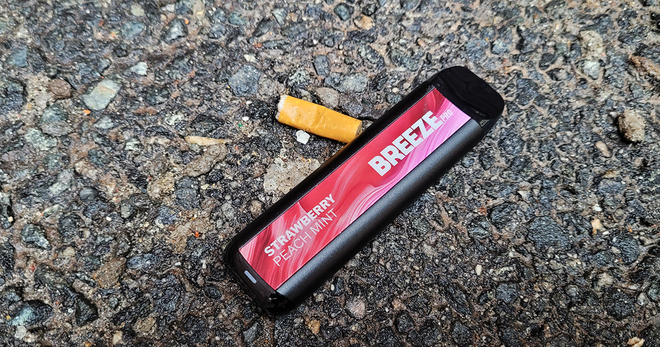E-cigarettes are creating a new source of environmental pollution
As youth vaping continues at epidemic levels, many young e-cigarette users report throwing away, improperly recycling, or littering the devices, according to Truth Initiative research that emphasizes the need for e-cigarette manufacturers to provide consumers with clear guidance on safe disposal.
More than half (51%) of young e-cigarette users surveyed reported disposing of used e-cigarette pods or empty disposables in the trash, 17% in a regular recycling bin not designed for e-cigarette waste, and 10% reported they simply throw them on the ground, according to the research conducted in 2020. A majority (75.7%) of e-cigarette owners surveyed said they considered recycling e-cigarettes, but almost half (49.1%) of users said they don’t know what to do with used e-cigarette pods and disposable devices.

Over 201 million new e-cigarette devices were sold in the U.S. in 2020, which could translate into millions of pieces of plastic, aluminum, lithium ion, and packaging that ends up in landfill. Many popular e-cigarettes, like JUUL, are pod-based with single-use plastic cartridges containing nicotine. Generating even more waste are disposable e-cigarettes like Puff Bar and Bidi Stick, which are designed entirely for one-time use and have skyrocketed in popularity with a 1,000% increase in use among high school students who are current e-cigarette users between 2019 and 2020. With an almost 400% increase in retail e-cigarette sales – not including online sales and from tobacco-specialty stores – from 2015 through 2020*, the environmental consequences of e-cigarette waste are enormous.
Young people understand the negative environmental impact of e-cigarette waste
Recycling e-cigarettes?
Even though most e-cigarette users aren’t disposing of e-cigarette waste in a way that minimizes impact on the environment, it’s not because they don’t recognize the dangers of littering their e-cigarette products.
In a separate study conducted in October 2019, researchers found that young people clearly understand that e-cigarette waste is bad for the environment. The majority of respondents between 15-34 recognized that empty e-cigarettes, pods, cartridges and refills are litter (86.9%) and that e-cigarettes are not biodegradable (65.7%). They also recognized the danger of throwing e-cigarette waste in the trash (75.8%). Most respondents acknowledged that e-cigarettes and related materials contain substances that are toxic to humans (84.1%) and harmful to animals (89.8%).
The tobacco industry fails to provide consumers with disposal info
How do you recycle e-cigarettes?
Young people’s habits when it comes to disposing of their used e-cigarette products should come as no surprise since e-cigarette manufacturers fail to provide consumers with guidance or take responsibility for appropriate disposal methods.
In the October 2019 Truth Initiative study, almost half (46.9%) of e-cigarette device owners said that the e-cigarette device they used currently did not provide any disposal information, such as where to send used batteries or empty pods. Additionally, when e-cigarette device owners were asked about e-cigarette waste disposal, the majority (73.7%) believed that it was difficult to find e-cigarette drop off sites.
Unlike other electronic makers, e-cigarette manufacturers do not provide consumers with clear instructions on how to properly handle e-cigarette waste once the e-cigarette or its accessories reaches the “end of life.” While tobacco companies engage in clean-up initiatives designed to make them appear “green” — just one of many tactics designed to overhaul their reputations (read the Truth Initiative report “Seeing Through Big Tobacco’s Spin”) – they leave the onus of figuring out how to safely dispose of e-cigarettes to the consumer.
* Source: Nielsen xAOC Including C-Store and Truth Initiative calculations**
**Disclaimer: The conclusions drawn from the Nielsen data are those of the researcher(s) and do not reflect the views of Nielsen. Nielsen is not responsible for, had no role in, and was not involved in analyzing and preparing the results reported
More in harmful effects of tobacco
Want support quitting? Join EX Program
By clicking JOIN, you agree to the Terms, Text Message Terms and Privacy Policy.
Msg&Data rates may apply; msgs are automated.


